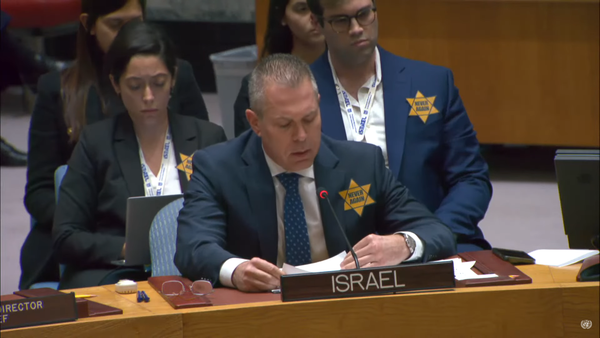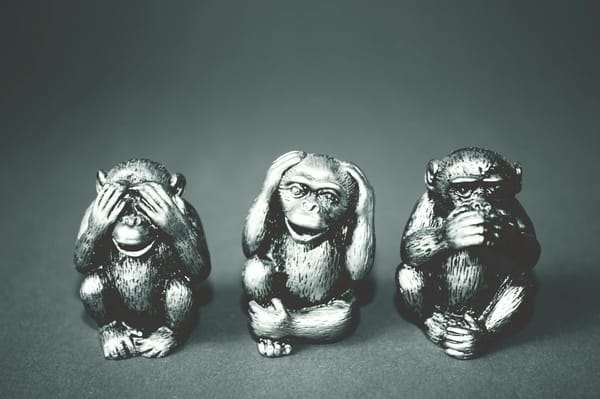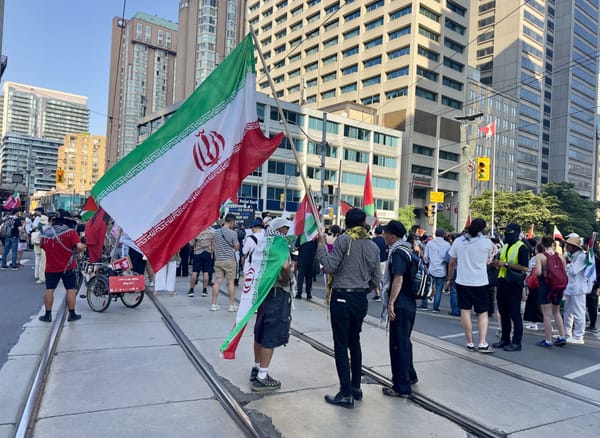Conservative media outlets responded to Olivia Chow’s mayoral election victory in Toronto last month by completely losing their minds.
Before Chow was even sworn in, the Toronto Sun put out flamboyant front-page spreads declaring that she’d “empty” Torontonians’ pockets through taxes, and could ban “anything gas-powered.”
This kind of hysteria is standard fare for most non-conservative politicians entering office in a viper’s nest of reactionary media. But besides these goofy headlines, a more sinister narrative about Chow has developed: Chow, like a string of other Chinese-Canadian politicians, is somehow, knowingly or not, tainted by the hand of Beijing.
We’ve heavily critiqued examples of the “Chinese interference” narrative here at The Maple (and Passage, the forerunner of our opinion section) several times. My colleague Davide Mastracci has compellingly picked apart several pieces of reporting on this topic. You can find some of his past articles on this topic here, here and here.
The hurls against Chow, however, are some of the most ludicrous and thinly-evidenced contributions to the “Chinese interference” narrative to date. It’s notable that unlike much of the past reporting on this broader story, the articles on Chow aren’t based on claims made by an ‘anonymous national security source,’ which means we can directly assess the evidence, such that it is, for the insinuations being made in these stories.
The evidence presented is extremely tenuous.
In mid-May, during the mayoral election campaign, the National Post reported that Chow met with and had received a “gift” (a porcelain vase) from a group called the Council of Newcomer Organizations (CNO). This group, the Post explained, “issued public statements harshly criticizing pro-democracy protesters in Hong Kong […] and decrying a parliamentary motion in 2019 that accused China of perpetrating a genocide against its Muslim Uyghur minority.”
The CNO website (which appears to have not been updated for nearly two years) indicates that some of the group’s past activities include events like badminton contests and New Year celebrations. Political pronouncements on its website appear to be rare, with one event advertised as commemorating the “World Anti-Fascist War-75th Anniversary of Victory,” referring to the defeat of Nazi Germany, Fascist Italy and Imperial Japan in the Second World War. Nonetheless, past reporting by the Post cited an Australian academic report that claimed CNO’s leaders, per the Post’s phrasing, “consistently promoted Beijing’s talking points” and “have been supported by China’s diplomatic missions in Canada.”
But the more recent Post article could identify just two occasions where CNO leaders “echoed talking points of the PRC government.” Besides these examples, the Post highlighted the fact that a past CNO official, a People’s Liberation Army (PLA) veteran, had reportedly “wept while watching a [PLA] military parade.” Nefarious stuff.
Regardless, based on the Post’s reporting on Chow, the extent of the new Toronto mayor’s alleged engagement with the group begins and ends with a single meeting during the municipal election campaign.
Is this noteworthy? Meeting with community groups during elections is common and indeed necessary for serious candidates, especially those running in a multicultural city like Toronto where Chinese people, many of whom don’t share the Post’s hostile stance toward China, make up nearly 11 per cent of the population.
Furthermore, Chow was the frontrunner in the mayoral race from the point she announced herself as a candidate. It’s easy to imagine that CNO was keen to establish a line of communication with the candidate who at that time was most likely to be the next mayor, regardless of whether that candidate aligned with their perspectives on Canada’s foreign policy on China (which has no direct relevance to a mayor’s duties anyways). Indeed, there is no indication of any political alignment or any kind of agreement or pressure between the group and Chow in the Post’s reporting.
In fact, the Post admitted in the article’s lede that “Olivia Chow has generally not been a close friend of the Chinese Communist Party (CCP)” (emphasis mine), noting Chow’s support for protests in Hong Kong and her participation in a small group of MPs who commemorated the violence that took place at Tiananmen Square in 1989. It did not offer any examples of where Chow has supported the Communist Party of China (CPC), which might justify its open-ended use of the word “generally.” The article presented no specific details about what the meeting allegedly entailed, and offered no suggestions that Chow is in any way aligned with CNO’s positions vis-a-vis China.
The Post story quoted an “expert” on China who said he was surprised by the meeting, along with an activist with an anti-communist group who made the point (like the one mentioned above) that pro-CPC proxies endorse candidates based on their chances of winning, not on their foreign policy positions. Another source also noted that meeting with community groups is a standard part of the campaign process.
In other words, the story’s sensationalist headline and its suggestion of nefarious activity hinged on an unremarkable campaign meeting with a stakeholder group. It’s hard to imagine that this would be considered newsworthy at all were it not for the current climate of paranoia and racism that scandalizes even the most tenuous associations with the ‘wrong’ kind of Chinese group.
This story and others like it do little more than fan the flames of this hysteria, while also priming the media climate to be even more receptive to future stories that rely on similarly weak evidence. It’s a feedback loop that’s inspiring increasingly unhinged comments directed at Chow and other politicians caught up in the narrative. The Post knows exactly how these stories will be interpreted, no matter how many caveats or how much context it provides. It chose to run this story and to accept this reaction despite having a lack of substantial evidence that anything inappropriate happened.
The Post didn’t stop there. On July 10, after Chow’s electoral victory, the newspaper reported that two “pro-Beijing groups” claimed they “went all out” to support Chow’s campaign with a “large number of volunteers.” Their help was reportedly unsolicited by Chow.
The Post offered no corroborating evidence (besides a WeChat post) or details about the number of volunteers or resources that the groups allegedly dedicated to helping Chow. The article’s source for that claim is a translated letter from one of the groups, which, like all such community groups, has a vested interest in convincing its stakeholders that it wields significant sway in local politics. It would not be the first time that an organization overstated its reach and influence to that end, and yet the Post showed no sign of skepticism nor did it indicate that it made any effort to verify the group’s claim.
But more importantly, the Post again offered no evidence of any kind of alignment between Chow and the groups in question. Unable to find solid evidence of Chow having actually done anything untoward, the article instead rests on the vague claim that the story “raises further questions about the involvement of Beijing and its local allies in Canadian politics.”
But the story does not offer convincing answers to this question, and certainly offers none that meaningfully implicate Chow. Like the story published in May, the July article noted Chow’s support for causes that run counter to the CPC, and cited the fact that she also received support from “two of Toronto’s fiercest critics of the Chinese regime.”
Given the flimsy premise of linking Chow to the above-mentioned “pro-Beijing” groups, what is this story really about? The fact that the article’s lede and headline zeroed in on the apparent support from groups described as being aligned with the Chinese government — as opposed to those who are against the government — gives a clue: that Chinese people in Canada are only supposed to associate with groups that are not just ambivalent about the government of China, but that are actively hostile to it. If they don’t, then they are liable to be presented as either stupid, or worse, as national security threats.
Indeed, the July article quoted an extremely patronizing remark from Jonathan Fon, “a Toronto-based commentator and Beijing critic,” who suggested that, “Those Chinese mainlanders have been programmed with Chinese communist propaganda, brainwashed.” This blanket slandering of an entire ethnic group is as ridiculous as it is useful for those who are not shy about advocating for a rerun of the Yellow Peril.
Chow herself is no stranger to being on the receiving end of racist attacks from corporate media. Back in 2014, the Toronto Sun ran a racist and misogynistic cartoon depicting Chow, then a candidate for Toronto mayor, in a suit similar to the one famously worn by Mao Zedong and riding the coattails of Jack Layton, her late husband and former leader of the federal NDP. Chow said of the cartoon: “It’s disgusting […] Because I am Chinese-Canadian, I must be a communist and have slanted eyes and glasses … and since I am a woman, I must be inferior and therefore not good enough for the job of the mayor so I must rely on my deceased husband so it is both racist and sexist.”
She has also been a critic of Canada’s spy agency in the past. Back in 2010, Chow called out CSIS’ then-emerging obsession with Canadian politicians being allegedly influenced by Chinese agents. In a news conference, Chow said, “Baseless spy stories belong in novels and movie theatres.” Asked if she thought CSIS had opened a file on her, Chow said: “I have no idea. If there is, let’s see the file.”
Of course, Chow couldn’t have known 13 years ago that this exact kind of ‘spy story’ would be the basis of smears against her newly inaugurated tenure as Toronto mayor.
Regardless, it’s long past time for this McCarthyite bullshit to end.







